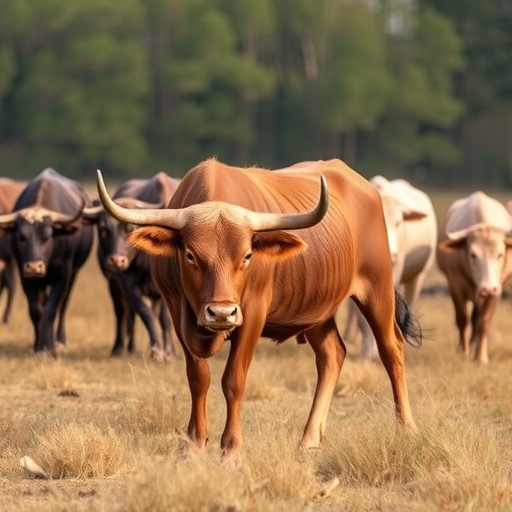In recent years, the genetic study of livestock has garnered immense interest due to its potential implications for agricultural productivity and sustainability. One significant aspect of this research includes investigating genetic polymorphisms in key genes that influence important traits such as milk production and reproductive efficiency. A groundbreaking study led by researchers Zaghloul, Khalil, and Iraqi, published in BMC Genomics, delves into genetic variations in the PRL (Prolactin), DGAT1 (Diacylglycerol O-acyltransferase 1), FSHR (Follicle Stimulating Hormone Receptor), and GH (Growth Hormone) genes in Egyptian buffalo, known scientifically as Bubalus bubalis. This research could revolutionize breeding practices, enhancing both the quality and quantity of milk produced by this vital livestock species.
The study investigates specific genetic polymorphisms present in the aforementioned genes, which are critical regulators of milk production and reproductive functions in mammals. The Prolactin gene, known for its role in lactation, influences mammary gland development as well as the synthesis of milk proteins. Understanding how variations in the PRL gene affect milk yield and quality could provide breeders with the knowledge needed to select for animals with superior milk-producing capabilities, optimizing their breeding programs.
Similarly, the DGAT1 gene, a pivotal player in lipid metabolism, has been closely linked to milk fat content. High dairy production is not merely a factor of milk volume; the composition of that milk, particularly concerning fat and protein levels, is equally crucial. This gene’s polymorphisms can lead to substantial variances in milk fat content, which is a significant economic factor for dairy farms. Therefore, by identifying deleterious polymorphisms at the DGAT1 locus, breeders can make informed decisions to select for higher fat content in the dairy produced by Egyptian buffalo.
On the reproductive front, genetic variations in the FSHR gene are vital for understanding fertility traits in livestock. Follicle-stimulating hormone receptors play a critical role in the growth and maturation of ovarian follicles, thus directly influencing fertility rates. The study correlates specific alleles of the FSHR gene with reproductive performance, such as the timing of estrous cycles and overall reproductive success. This correlation is particularly important in a country such as Egypt, where efficient breeding practices can lead to increased economic returns from livestock farming.
Another significant gene explored in this research is the GH gene, responsible for growth hormone production. Growth hormone is integral not only for growth and development of livestock but also intersects with metabolic processes that impact milk production. By analyzing polymorphisms within the GH gene, the researchers aim to establish a connection between these genetic factors and variations in growth rates and milk yield in Egyptian buffalo. Discovering associations here could inform breeding strategies aimed at enhancing both growth and productivity in these animals.
The implications of this research extend beyond just genetic breeding strategies; they highlight the importance of genetic diversity within livestock populations. Genetic diversity can provide resilience against diseases and environmental changes, ensuring the long-term sustainability of livestock farming amid global challenges like climate change. The study contributes to existing knowledge about the genetic resources available within the Egyptian buffalo population, fostering an increased understanding of how to effectively utilize these resources.
Moreover, as the demand for dairy products continues to rise in various parts of the world, this research holds significant implications for food security. Enhancing the productivity of livestock through genetic polymorphism studies can lead to an increased supply of dairy products without the need for additional land or resources. This aligns with a growing push for sustainable agricultural practices that aim to meet future food demands responsibly.
Additionally, the methodologies employed in this study illustrate the advancements in genomic technologies that allow for a deeper analysis of genetic data. High-throughput sequencing and bioinformatics tools facilitate the identification of polymorphisms that were previously undetectable. Such advancements are critical for researchers aiming to improve livestock genetics as they can lead to more precise and efficient breeding programs.
The integration of genetic studies into livestock management also poses educational opportunities. Farmers and breeders can be equipped with the knowledge necessary to understand the genetic makeup of their animals, allowing them to make better selections based on empirical data. This education can transform traditional breeding practices, emphasizing data-driven decisions over anecdotal methods.
In conclusion, the genetic polymorphisms identified in the study by Zaghloul et al. reflect the importance of advanced genetic research in enhancing livestock productivity, particularly in terms of milk production and reproductive performance in Egyptian buffalo. By understanding the genetic underpinnings of these traits, stakeholders in the agricultural industry can make informed decisions that promote both efficiency and sustainability. This work not only contributes significantly to the body of knowledge regarding buffalo genetics but also paves the way for future studies aimed at revolutionizing livestock breeding and management practices.
This research emphasizes the synergy between scientific discovery and practical application in livestock farming. The relevance of strategic genetic selection in improving dairy production cannot be overstated, as it serves as a testament to how science can address real-world agricultural challenges. As we look towards the future, such studies will undoubtedly play a crucial role in shaping the landscape of global dairy production and securing food sources for upcoming generations.
Subject of Research: Genetic polymorphisms of PRL, DGAT1, FSHR, and GH genes in Egyptian Buffalo and their associations with milk and reproduction traits.
Article Title: Genetic polymorphisms of PRL, DGAT1, FSHR, and GH genes and their associations with milk and reproduction traits in Egyptian Buffalo (Bubalus bubalis).
Article References:
Zaghloul, A.R., Khalil, M.H., Iraqi, M.M. et al. Genetic polymorphisms of PRL, DGAT1, FSHR, and GH genes and their associations with milk and reproduction traits in Egyptian Buffalo (Bubalus bubalis).
BMC Genomics 26, 909 (2025). https://doi.org/10.1186/s12864-025-12019-5
Image Credits: AI Generated
DOI: 10.1186/s12864-025-12019-5
Keywords: Genetic Polymorphisms, Egyptian Buffalo, Milk Production, Reproductive Traits, PRL, DGAT1, FSHR, GH, Sustainable Agriculture, Food Security, Livestock Genetics




